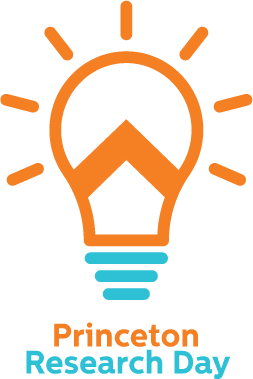Sixth annual Princeton Research Day goes virtual to celebrate research and creative work
Ancient serrated coins, reverse immigration, quantum spin liquids and Winston Churchill’s WWII speeches: These are some of the diverse topics that Princeton’s students and early career researchers bring to life at Princeton Research Day, the University’s celebration of research, scholarship and creative work, to be held May 6.
logo with a lightbulb and chevron, “Princeton Research Day”
The annual event, which this year will be entirely virtual due to the coronavirus pandemic, is an opportunity for undergraduates, graduate students, postdoctoral researchers and other early career presenters to share research across disciplinary lines using everyday language with appeal to broad audiences.
“The research we produce on our campus is world-changing; Princeton Research Day offers us the chance to circulate it, to interrogate it, and to celebrate it with a broad and engaged audience,” said Dean of the College Jill Dolan, the Annan Professor in English and professor of theater in the Lewis Center for the Arts. “I’m delighted that we can come together this year virtually to stage Princeton Research Day. Each year, I so appreciate that we can all take a moment to focus on and to celebrate the research that happens in our labs and studios and other workspaces all over campus.”
Throughout the next few months, Princeton researchers will hone their presentation skills to create 3-minute videos about their research, scholarship or creative works.
The popular event features presentations in the arts and humanities, natural sciences, social sciences and engineering.
“The pandemic has brought into focus, with unprecedented sharpness and clarity, the importance of communicating to broad audiences about complex topics,” said Dean for Research Pablo Debenedetti, Class of 1950 Professor in Engineering and Applied Science and professor of chemical and biological engineering. “Princeton Research Day offers the opportunity for our early career researchers and students to describe their research and creative works, which are often quite specialized, in ways that resonate broadly with people from a range of backgrounds.”
The window to submit videos opens March 31, and videos will be posted online starting April 30 for viewing by all and judging by a select panel.
The season culminates in an online exposition on May 6 with presentation of the top videos and the awarding of prizes. During the program, the broader Princeton community — as well as viewers worldwide — can ask questions and engage with the presenters in a live, online format.
Participants can work on their presentations and receive feedback during a series of workshops offered in March and April.
“It is one of the really unique opportunities on an international scale that advanced undergrads have to express their research,” said Ilia Curto Pelle, who participated last year as a sophomore with a presentation on serrated coins produced during the Seleucid Dynasty, roughly 150 years B.C. “The effort to prepare and to distill my thoughts into a presentation actually helped me engage more fully with my work.”
Alice Tianbo Zhang, who last year was a postdoctoral researcher in Princeton School of Public and International Affairs, presented on the “Power of the River: Introducing the Global Dam Tracker.”
“Princeton Research Day was one of the highlights of my postdoctoral research appointment,” said Zhang, who is now an assistant professor of economics at Washington and Lee University. “Even though the sessions happened remotely due to COVID, with recorded talks, the day brought a sense of community and a shared sense of purpose. It was amazing to see the breadth and depth of research being carried out across campus by people with such a diverse set of interests, backgrounds and expertise.”
Chemistry graduate student Loi Nguyen, whose entry was on quantum spin liquids, said, “After I presented my research at Princeton Research Day 2020, some people reached out to me and asked more about my work. The experience helped me feel more confident in presentation and communication. I would recommend that other science researchers participate, because effective communication is key to success in research.”

